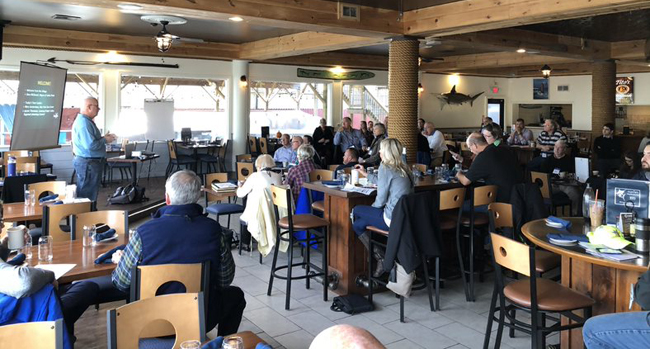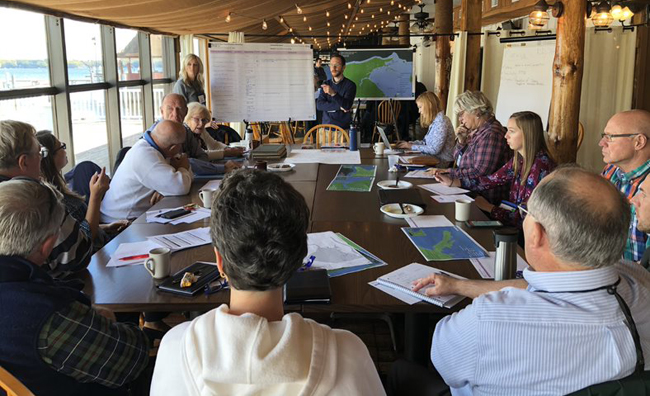— By Kara Dunn, Great Lakes Freelance Writer, New York Sea Grant
Coastal Communities Can Follow Sodus Point Model
Contact:
Mary Austerman, New York Sea Grant Coastal Community Development Specialist, P: 315-331-8415 x121, E: mp357@cornell.edu
Sodus Point, NY, November 13, 2018 - The record-high water event in 2017 hit the Village of Sodus Point, 40 miles east of Rochester, N.Y., hard. Water from Lake Ontario’s largest south shore bay overran shoreline and breakwalls causing persistent inundation to waterfront homes and businesses and flooding streets. As a result, the Village is partnering with New York Sea Grant (NYSG) and the Genesee/Finger Lakes Regional Planning Council (G/FLRPC) to initiate flood resiliency planning.
NYSG and G/FLRPC established and piloted (are developing) a public visioning process for resiliency planning that is designed to be transferable to other communities.
A self-assessment checklist completed by NYSG and GFLPC with Sodus Point’s Mayor, Code Enforcement Officer, and Trustee to identify flooding vulnerabilities served to inform a Post-Flood Recovery Building Workshop (the first of its kind, organized by NYSG and G/FLRPC) held in October 2018 for the Village of Sodus Point.

Mayor Dave McDowell welcomes participants to the
Post-Flood Recovery Building Workshop in Sodus Point. Development of
this workshop as well as a related self-assessment checklist were
sponsored by New York Sea Grant with additional
funding from the National Oceanic and Atmospheric Administration’s
Community Climate Adaptation Initiative and the New York Great Lakes
Basin Small Grants Program (Environmental Protection Funds under the
authority of the New York Ocean and Great Lakes Ecosystem Conservation
Act). Credit: Genesee/Finger Lakes Regional Planning Council/Jayme Thomann.
Workshop participants included a welcome mix of local residents, Village staff, Village and County department representatives, and topical experts with state and federal agencies, organizations, and academia. They discussed the character and demographics of Sodus Point and how the flood impacted the village from the perspective of the residential, business and municipal sectors.
Breakout groups focused on economic development and tourism, environment, and infrastructure to identify the features, assets and procedures that worked well and not well and how to improve functionality in the face of future flooding events.

This breakout session at the Post-Flood Recovery Building Workshop at a Sodus Point waterfront business addressed the economic development considerations. Following the flood but before this workshop, the Village of Sodus Point had already taken some steps
toward improving resiliency. For example, a newly-developed Village
newsletter keeps residents informed about water levels, improvements to
the Village wastewater system are nearly complete, some breakwalls have
been upgraded, and the Village has purchased a sandbagging machine to
have at the ready. Credit: Genesee/Finger Lakes Regional Planning Council/Jayme Thomann.
“Visioning through a public engagement process brings various stakeholders together to establish shared goals for promoting community resiliency and ecosystem integrity,” said Mary Austerman, a NYSG Community Development Specialist in the Great Lakes region.
“Deliberate post-event planning with ‘whole community’ participation is key for both recovery and future preparedness as well as cost-effectiveness. Not all recovery solutions have to be million-dollar solutions,” said Jayme B. Thomann, G/FLRPC Senior Planner, co-coordinator and facilitator of the workshop.
NYSG and G/FLRPC will present the Village board with a summary of the workshop outcomes for municipal consideration, including top actions expressed as rough project concepts with potential funding sources.
“Going forward, we will review the workshop recommendations for actions we can take to put us in a much better position to deal with future events,” said Sodus Point Mayor Dave McDowell.
“The workshop interaction definitely created a sense of optimism that in the future we will be out in front of rising waters with actions ready to prevent the water from coming on shore and before our streets are flooded,” he added.
More Info: New York Sea Grant
New York Sea Grant (NYSG), a cooperative program of Cornell University
and the State University of New York (SUNY), is one of 33 university-based
programs under the National Oceanic and Atmospheric Administration’s
National Sea Grant College Program.
Since 1971, NYSG has represented a statewide network of integrated
research, education and extension services promoting coastal community
economic vitality, environmental sustainability and citizen awareness
and understanding about the State’s marine and Great Lakes resources.
Through NYSG’s efforts, the combined talents of university scientists
and extension specialists help develop and transfer science-based
information to many coastal user groups—businesses and industries,
federal, state and local government decision-makers and agency managers,
educators, the media and the interested public.
The program maintains Great Lakes offices at Cornell University, SUNY
Buffalo, SUNY Oswego and the Wayne County Cooperative Extension office
in Newark. In the State's marine waters, NYSG has offices at Stony Brook
University in Long Island, Brooklyn College and Cornell Cooperative
Extension in NYC and Kingston in the Hudson Valley.
For updates on Sea Grant activities: www.nyseagrant.org has RSS, Facebook, Twitter, and YouTube links. NYSG offers a free e-list sign up via www.nyseagrant.org/nycoastlines for its flagship publication, NY Coastlines/Currents, which is published quarterly. Our program also produces an occasional e-newsletter,"NOAA Sea Grant's Social Media Review," via its blog, www.nyseagrant.org/blog.